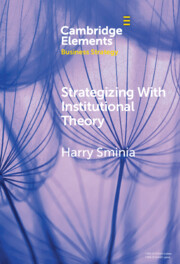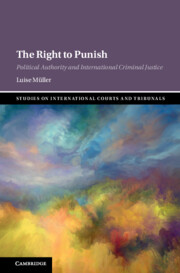482 results
6 - The Myth of Rural Radicalism
-
- Book:
- Reviving Rural America
- Print publication:
- 27 June 2024, pp 130-155
-
- Chapter
- Export citation
5 - Law and the State
-
-
- Book:
- The Cambridge Comparative History of Ancient Law
- Published online:
- 09 May 2024
- Print publication:
- 30 May 2024, pp 181-230
-
- Chapter
- Export citation

Strategizing With Institutional Theory
-
- Published online:
- 21 May 2024
- Print publication:
- 13 June 2024
-
- Element
- Export citation
2 - The BJP’s Ideological Heterodoxy
-
- Book:
- The New Experts
- Published online:
- 09 May 2024
- Print publication:
- 16 May 2024, pp 17-59
-
- Chapter
- Export citation

The Right to Punish
- Political Authority and International Criminal Justice
-
- Published online:
- 16 May 2024
- Print publication:
- 23 May 2024
Conclusion
-
- Book:
- The New Experts
- Published online:
- 09 May 2024
- Print publication:
- 16 May 2024, pp 162-166
-
- Chapter
- Export citation
8 - Khameneism and the Absolute Velayat-e Faqih
-
- Book:
- How Islam Rules in Iran
- Published online:
- 02 May 2024
- Print publication:
- 09 May 2024, pp 264-296
-
- Chapter
- Export citation
7 - Legitimate Authority
-
- Book:
- How Islam Rules in Iran
- Published online:
- 02 May 2024
- Print publication:
- 09 May 2024, pp 238-263
-
- Chapter
- Export citation
A new philosophy for international legal skepticism?
-
- Journal:
- International Theory , First View
- Published online by Cambridge University Press:
- 30 April 2024, pp. 1-32
-
- Article
-
- You have access
- Open access
- HTML
- Export citation
7 - Conclusion
-
- Book:
- European Human Rights Grey Zones
- Published online:
- 18 April 2024
- Print publication:
- 25 April 2024, pp 229-234
-
- Chapter
- Export citation
1 - Rousseau’s Sovereignty and the Concept of Constitutional Identity
- from Part I - Foundations, Theory, and Concepts
-
-
- Book:
- Deciphering the Genome of Constitutionalism
- Published online:
- 14 March 2024
- Print publication:
- 21 March 2024, pp 23-33
-
- Chapter
-
- You have access
- HTML
- Export citation
Diffuse Support, Partisanship, and the Electoral Relevance of the Supreme Court
-
- Journal:
- Journal of Law and Courts ,
- Published online by Cambridge University Press:
- 14 March 2024, pp. 1-21
-
- Article
-
- You have access
- Open access
- HTML
- Export citation
Legitimate governance in international politics: Towards a relational theory of legitimation
-
- Journal:
- Review of International Studies , First View
- Published online by Cambridge University Press:
- 08 March 2024, pp. 1-20
-
- Article
-
- You have access
- Open access
- HTML
- Export citation
1 - A Public Conception of Political Authority
-
- Book:
- Reclaiming the Public
- Published online:
- 22 February 2024
- Print publication:
- 29 February 2024, pp 14-40
-
- Chapter
-
- You have access
- HTML
- Export citation
2 - Law as Standing
-
- Book:
- Reclaiming the Public
- Published online:
- 22 February 2024
- Print publication:
- 29 February 2024, pp 41-63
-
- Chapter
- Export citation
8 - The Marrakech Partnership for Global Climate Action
-
-
- Book:
- International Public Administrations in Environmental Governance
- Published online:
- 22 February 2024
- Print publication:
- 29 February 2024, pp 180-200
-
- Chapter
-
- You have access
- Open access
- HTML
- Export citation
Légitimités conflictuelles: le droit international humanitaire entre légitimité du statut et légitimité de la cause
-
- Journal:
- Canadian Yearbook of International Law / Annuaire canadien de droit international , First View
- Published online by Cambridge University Press:
- 26 February 2024, pp. 1-33
-
- Article
-
- You have access
- Open access
- HTML
- Export citation
7 - Compliance with Science-Based Treaties
- from Part II - Specific Procedures
-
-
- Book:
- International Courts versus Non-Compliance Mechanisms
- Published online:
- 15 February 2024
- Print publication:
- 22 February 2024, pp 145-168
-
- Chapter
-
- You have access
- Open access
- HTML
- Export citation
3 - What If There Is No Legislator?
-
-
- Book:
- The Cambridge Companion to Rousseau's <i>Social Contract</i>
- Published online:
- 28 March 2024
- Print publication:
- 22 February 2024, pp 40-63
-
- Chapter
- Export citation
3 - The New Generation of Environmental Non-Compliance Procedures and the Question of Legitimacy
- from Part I - General and Conceptual Issues
-
-
- Book:
- International Courts versus Non-Compliance Mechanisms
- Published online:
- 15 February 2024
- Print publication:
- 22 February 2024, pp 49-70
-
- Chapter
-
- You have access
- Open access
- HTML
- Export citation



